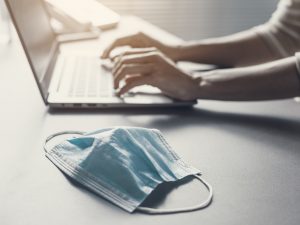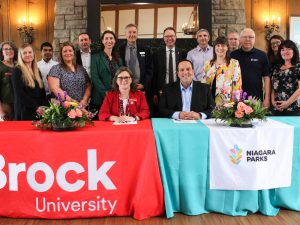Waiting in hospital as a loved one undergoes surgery can be stressful, with worry only growing as minutes tick by without word.
In an effort to help keep families informed about their loved one’s progress, a surgical tracking display system, developed by Niagara Health, was recently enhanced by Brock University student James Hall.
In 2012, Niagara Health launched the system, which provides confidential updates for families in real time on monitors in waiting rooms. In September 2016, the system’s enhancement was identified as a potential project for Brock’s Interprofessional Education for Quality Improvement Program (I-EQUIP). The program provides health professionals and Brock students from any Faculty the opportunity to work together on two-year health system improvement projects.

James Hall has spent his two years in Brock’s I-EQUIP helping Niagara Health enhance their current surgical tracking display for patients and families.
As an I-EQUIP participant, Hall was instrumental in helping to enhance the tracking system based on user research he conducted.
“When we were doing interviews, people indicated there is a lot of anxiety around a surgical procedure, and expressed that they wanted to know what was going on with their loved one,” said Hall. “We used the data we collected in a report to make the necessary adjustments. We came up with a layout that made things easier for everyone to read and allowed families to remain informed about their loved one’s progress.”
The new system gives families confidential electronic updates to let them know exactly where their loved one is in the surgery process.
Jean Paul Paraiso, Niagara Health Perioperative Business Manager, said Hall helped to “improve a legacy system for patient communication by understanding their needs.”
“Together with our IT department, he was able to make improvements to that system based on data and feedback,” Paraiso said. “He was very methodical.”
Hall felt the chance to engage in an experiential learning exercise that also had tangible and immediate benefits to the community was an opportunity that could not be missed.
“I think experiential learning is very important and is the way of the future for education,” he said. “Doing a project through I-EQUIP gives us an opportunity to apply what we have learned in our class, and allows us to put skills on a resumé.”
The tracking tool is one of 22 I-EQUIP projects currently underway, which focus on everything from care transitions and medical imaging management to collecting patient satisfaction data and using music therapy in extended care. For the program’s founder, Associate Professor Madelyn Law, the impact I-EQUIP has on its participants and the community is evident.
“In the program, our students develop transferable skills, like networking, communication and teamwork, that they don’t always learn in the classroom,” she said. “And they do all of that while assisting health-related organizations to enhance their services and programs for the people of Niagara.”
Hall echoed this sentiment when talking about his own course experience.
“I love going into the community and engaging with people,” he said. “I think when you speak with people in different positions you can learn more about the jobs that are available to you. Sometimes, while we are at school, we only see a direct path, but out in the community you see so much more.”
With the new tracking program receiving a score of 15.1 out of 16 from users on a recent satisfaction questionnaire, work is now underway by Hall and Niagara Health to develop an app to further display the improved system on mobile devices.
Linda Boich, Executive Vice-President of Quality, Community Development and Mental Health and Addictions for Niagara Health, said I-EQUIP provides value in many ways to both the organization and the students who take part.
“The program provides an excellent opportunity for Niagara Health staff to serve as mentors; our staff and physicians are leading innovative quality improvement projects and the students are obtaining important hands-on experience, learning about how the health system functions within a quality improvement environment,” she said.
Hall, a fourth-year student, has used his I-EQUIP experience to improve the lives of others and prepare himself for the working world — and he hopes other students will consider doing the same.
“I would strongly encourage anyone to take part in I-EQUIP or any experiential course,” he said. “It has been one of the most enriching experiences of my studies, and it’s been great to impact the medical field while also learning where I will fit in that field after I graduate.”
All I-EQUIP projects will be presented at the Brock Student Engagement in Quality Improvement Conference on Saturday, April 28 at Brock.
To learn more about I-EQUIP and the conference, visit the program’s website.










